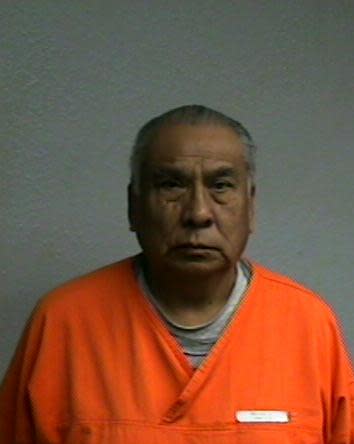McGirt agrees to plea guilty ahead of retrial in sexual abuse case

An Oklahoma man at the center of a landmark U.S. Supreme Court decision on tribal sovereignty has entered a guilty plea to sexually abusing a child in exchange for getting credit for time already served in prison.
In Muskogee federal court Tuesday, Jimcy McGirt, 75, of Holdenville, entered a guilty plea to one count of aggravated sexual abuse in Indian Country.
The written plea agreement recommends McGirt, who was convicted of sexually abusing a 4-year-old girl in 1996, be sentenced to 30 years in prison followed by five years of probation.
Attorneys agreed to recommend McGirt be given credit for the time he previously served in both state and federal custody on previous convictions related to the case, the U.S. Department of Justice said.
“It’s been a long time,” Richard O’Carroll, the Tulsa-based attorney, told The Oklahoman on Wednesday. “He’s served more than 30 years as computed by the Bureau of Prisons. He has a family structure outside the walls and he’s looking forward to his release.”
McGirt’s plea change came just days before his federal court retrial.
What to know about the plea, and what happens next
The plea agreement says, in part:
“In reaching this agreement, the parties have considered various factors, including, but not limited to: the defendant’s acceptance of responsibility; the age of witnesses needed to testify; the impact of their testimony on their well-being and their relationship to the parties; judicial economy; and the interests of justice.”
U.S. Magistrate Judge Jason A. Robertson presided over the plea hearing and ordered the completion of a presentence investigation report.
McGirt will remain in the custody of the U.S. Marshals Service until his sentencing hearing, which has not yet been set. At that time, the court will determine whether to accept the plea agreement.
A Justice Department spokesperson told The Oklahoman on Wednesday no comment would be forthcoming.
In June, the 10th U.S. Circuit Court of Appeals ruled that a U.S. district judge in Muskogee committed an error in instructing the jury in 2020 and overturned McGirt’s convictions on two counts of aggravated sexual abuse in Indian Country and one count of abusive sexual contact in Indian Country.
McGirt was given three life sentences in 2021.
Supreme Court ruling on McGirt case reshaped criminal jurisdiction in parts of Oklahoma
McGirt’s federal trial followed his release from state prison after the U.S. Supreme Court ruled he was wrongly tried by Oklahoma state prosecutors for he is Native American and the crimes occurred on the Muscogee (Creek) reservation, which was never officially disestablished by Congress.
The 2020 high court decision reshaped criminal jurisdiction in eastern Oklahoma, where reservations have since been affirmed for the Cherokee, Chickasaw, Choctaw, Ottawa, Peoria, Quapaw and Seminole nations.
Now, Native American defendants are tried by federal or tribal prosecutors for crimes committed on the reservations.
“Jimcy’s a very intelligent man and he is fully aware of his impact,” O’Carroll told The Oklahoman.
The U.S. Supreme Court ruled last year that the state has criminal jurisdiction concurrent with the federal government over non-Indians accused of crimes against Native Americans.
In McGirt’s federal appeal, the 10th Circuit court ruled that the jury in the Eastern District of Oklahoma case was wrongly limited in how it could weigh inconsistent testimony from the witnesses made at McGirt’s criminal proceedings in 1997.
“Unquestionably, there was sufficient evidence to sustain the verdicts,” the appeals court said. But the court pointed to “internal inconsistencies and weaknesses in the testimony by the government witnesses” that “demonstrates the significance of the district court’s decision to prohibit the jury from considering the witnesses’ prior inconsistent statements as substantive evidence.”
Because the appeals court reversed McGirt’s convictions, it did not rule on his arguments about his three life sentences, which required a variance from federal sentencing guidelines.
The court rejected new jurisdiction claims made by McGirt, including that his prosecution violated a treaty between the Muscogee (Creek) Nation and the U.S. government.
The court said the 2020 decision by the U.S. Supreme Court acknowledged that the Major Crimes Act violated tribal self-governance promises but that it also upheld the federal government’s jurisdiction over McGirt.
This article originally appeared on Oklahoman: Days before retrial in Oklahoma, McGirt agrees to plea guilty
